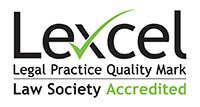Money laundering
The Proceeds of Crime Act 2002 and the Money Laundering -Regulations 2003 (effective from 1st March 2004) has put all professionals under a duty (breach of which is punishable by imprisonment) to report to the authorities wherever there are reasonable grounds for suspecting that they are being asked or expected to deal with "Criminal Property" by any person. We would stress that this duty overrides any duty of confidentiality or otherwise which we may owe you.
"Criminal Property" means either the proceeds of crime or any asset or property which represents the proceeds of crime. For the purposes of this duty, there is no minimum sum or type of crime - it extends from major crime such as drug trafficking involving large amounts of money to small sums arising out of tax evasion or benefit fraud. As commentators have observed, the legislation is drafted so widely (deliberately) that it is going to cause problems when dealing with clients who work in a sector where is it thought common place for dealings to take place in cash to evade tax (be it income tax or VAT). It does not extend to circumstances where we are acting in criminal proceedings.
Moreover the duty extends to suspicions in respect of any person i.e. it is not limited to our clients. If therefore we are involved in a matter where suspicion arises in relation to the party on the other side of your case or transaction then the duty applies.
For example when dealing with a financial settlement in a divorce case, the relevant court rules require full disclosure by each party as to its financial position. It may become apparent for example in a case where we are acting for the wife that the husband is not declaring all of his income for income tax purposes or indeed our client, the wife, may confirm that the accounts he has produced are not believable because she knows he has always accepted payment in cash so as to evade accounting for VAT. If, as is very likely, the financial settlement is going to involve a transfer of assets from the husband to the wife, then effectively that transfer will amount to dealing with the proceeds of crime and the duty to report would then arise. Indeed the act of reporting would be as much to protect the wife in this instance as she would otherwise receive the proceeds of crime.
Not surprisingly it is therefore our firm's strict policy to take such responsibilities seriously and we have no choice but to report any suspicions in the required manner even if this must jeopardise our client's case or transaction. Accordingly our internal procedures have been reviewed and amended as necessary.
The regulations also impose a specific obligation upon us to check the identity of every client be they new clients or existing clients for whom we are undertaking new business. For that reason we need to ask you to produce evidence of your identity even where you have been a client before. In the first instance the only acceptable evidence of identification will be one of the following:
- Current signed passport.
- EU member state identity card.
- Residents permit issued by the Home Office together with own country's passport.
- Current EU or UK photocard driving licence.
- Armed Forces ID Card
You will appreciate that all these are official documents which incorporate a photograph so we may be certain that each client with whom we are dealing, is the person he or she claims to be.
We understand that not every client may have a passport and that not every driver, as yet, holds a photocard driving licence. For this reason in such circumstances alternative evidence of identity may be acceptable, if authorised by the appropriate Partner of the firm.
We shall also require proof of current address.
Documentary evidence of address should be any two of the following:
- Confirmation from the electoral register
- Recent utility bill or bank statement or mortgage statement with the current address
- Local Authority Council Tax/Rates bill
- Current UK driving licence (but only if not used as evidence of ID)
- Local Council rent card or tenancy agreement.
In addition due to the major changes in the way in which Stamp Duty is dealt with by the Inland Revenue upon completion of any property transaction, we must now ask all clients (whether we are acting directly or for a company or other organisation they represent) to provide their National Insurance Number.
You will appreciate that the need for the production of such identification does add to the "red tape" before we can commence work on your behalf but unfortunately in the circumstances we have no alternative and we must ask you to bear with us. In all cases it will be necessary for us to retain copies of the identification documentation you produce. In due course we hope to put in place a centralised client identification record keeping system which will avoid the need for repeated production of identification evidence. However until the necessary software is available and proven such a system will not be practicable and therefore regrettably you may find you are asked to produce such evidence whenever you instruct us on a new matter even if you have already recently provided it.
Please bear with us should that happen.
As our intention is to have a centralised record to avoid such repeated identification checks we must point out that production of your identity documents will be deemed to be consent to the storage of such copies on our computer system in due course.
You will have noted what we have said above regarding the proceeds of crime. In order to avoid unnecessary suspicions you may be questioned and asked to provide, for example, evidence of the source of monies that you intend to use as a deposit for a purchase of property. We sympathise that you may find such questions intrusive but please understand that such requests do not necessarily imply any mistrust or doubt on our part but rather reflect the new routines that we have been forced to adopt. We would stress that such inquiries are intended to eliminate the risk of suspicion and will not be an attempt to find grounds for suspicion.
If any of our members of staff have any concern that we are being asked to deal with proceeds of crime or Criminal Property then that suspicion is to be reported internally to the Partners. The Partners are then under an obligation to report that to the National Crime Agency (NCA). One consequence of the legislation is that it introduces a separate offence of "tipping off" which in practice means we would not be able to inform anyone, including our client, that we had made such report. At the same time we would not be able to complete the work which we were in the process of undertaking for you.
We appreciate that if reporting any suspicion causes us to cease work on your file, this could have unfortunate and adverse consequences for example, if we were unable to proceed with an exchange of contracts or even completion of a property sale or purchase. However, that situation would only arise in the event of our fulfilling our statutory duty to report any suspicious circumstances to NCA.
PROCEEDS OF CRIME and MONEY LAUNDERING
DISCLAIMER and EXCLUSION OF LIABILITY
Accordingly, we must make it clear to you that we will not accept responsibility for any consequential losses, costs, claims, demands or expenses incurred by you as a result of our being obliged to cease work on your behalf as a result of a report made to NCA in good faith.





%5B1%5D.png)